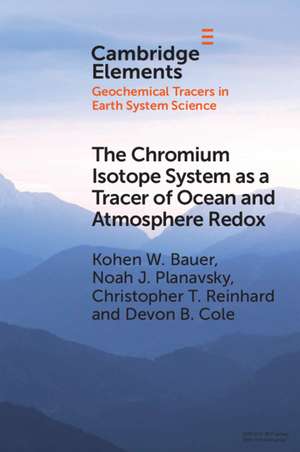The Chromium Isotope System as a Tracer of Ocean and Atmosphere Redox: Elements in Geochemical Tracers in Earth System Science
Autor Kohen W. Bauer, Noah J. Planavsky, Christopher T. Reinhard, Devon B. Coleen Limba Engleză Paperback – 24 feb 2021
Din seria Elements in Geochemical Tracers in Earth System Science
-
 Preț: 128.73 lei
Preț: 128.73 lei -
 Preț: 128.73 lei
Preț: 128.73 lei -
 Preț: 128.73 lei
Preț: 128.73 lei -
 Preț: 159.52 lei
Preț: 159.52 lei -
 Preț: 159.30 lei
Preț: 159.30 lei -
 Preț: 159.10 lei
Preț: 159.10 lei -
 Preț: 140.70 lei
Preț: 140.70 lei -
 Preț: 140.48 lei
Preț: 140.48 lei -
 Preț: 140.28 lei
Preț: 140.28 lei -
 Preț: 140.87 lei
Preț: 140.87 lei -
 Preț: 140.28 lei
Preț: 140.28 lei -
 Preț: 140.48 lei
Preț: 140.48 lei -
 Preț: 140.10 lei
Preț: 140.10 lei -
 Preț: 140.70 lei
Preț: 140.70 lei -
 Preț: 140.48 lei
Preț: 140.48 lei -
 Preț: 141.47 lei
Preț: 141.47 lei -
 Preț: 140.48 lei
Preț: 140.48 lei -
 Preț: 141.09 lei
Preț: 141.09 lei -
 Preț: 140.48 lei
Preț: 140.48 lei -
 Preț: 140.87 lei
Preț: 140.87 lei -
 Preț: 141.25 lei
Preț: 141.25 lei -
 Preț: 140.48 lei
Preț: 140.48 lei
Preț: 140.48 lei
Nou
Puncte Express: 211
Preț estimativ în valută:
26.88€ • 27.100$ • 22.41£
26.88€ • 27.100$ • 22.41£
Carte tipărită la comandă
Livrare economică 28 martie-11 aprilie
Preluare comenzi: 021 569.72.76
Specificații
ISBN-13: 9781108792578
ISBN-10: 110879257X
Pagini: 75
Dimensiuni: 230 x 150 x 3 mm
Greutate: 0.06 kg
Editura: Cambridge University Press
Colecția Cambridge University Press
Seria Elements in Geochemical Tracers in Earth System Science
Locul publicării:Cambridge, United Kingdom
ISBN-10: 110879257X
Pagini: 75
Dimensiuni: 230 x 150 x 3 mm
Greutate: 0.06 kg
Editura: Cambridge University Press
Colecția Cambridge University Press
Seria Elements in Geochemical Tracers in Earth System Science
Locul publicării:Cambridge, United Kingdom
Cuprins
1. Introduction; 2. Basics of Cr speciation and isotope fractionations; 3. A global Cr isotope mass balance?; 4. Seawater Cr isotope values; 5. The sedimentary Cr isotope record; 6. Summary and future directions.
Descriere
We introduce chromium isotopes as a tool to track earth's long-term oxygenation and track deoxygenation during past warming events.
